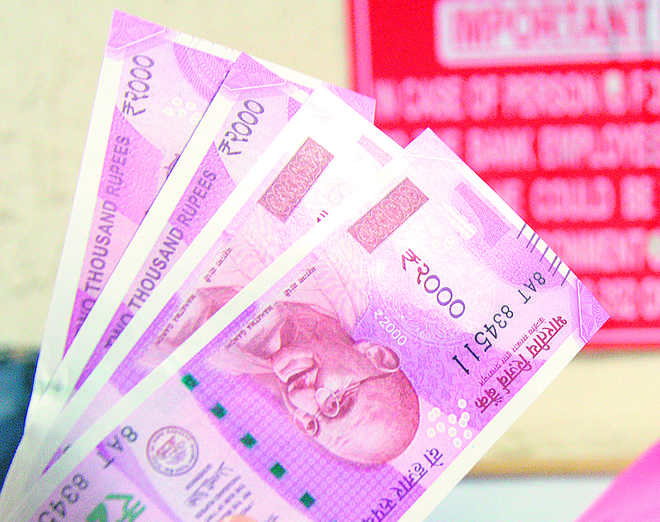
Karan Thapar
Senior journalist and television commentator
On its first anniversary, most of the analyses of demonetisation were connected to the objective of tackling black money. This was the raison d'etre that appealed to everyone and, therefore, the popular touchstone to judge its performance. As a result, the government's claims about what demonetisation has done to the use of cash have not got the critical scrutiny they require. Yet, after the initial November 8, 2016 announcement, this was the objective the government seemed to lay most stress on. So, let's look closely at this specific set of facts.
Leap in digital payment
In the essay he posted on his blog on November 7, the Finance Minister said: "India has taken a big leap in digital payment during 2016-17". To illustrate his point he cited three facts: (1) In 2016-17 there were a 110 crore transactions, valued at 3.3 lakh crore, carried out by credit cards and a further 240 crore transactions, coincidentally once again valued at 3.3 lakh crore, carried out by debit cards. In the previous year, the value of transactions for debit and credit cards was 1.6 lakh crore and 2.4 lakh crore, respectively. (2) The total value of transactions with pre-paid instruments increased from Rs 48,800 crore in 2015-16 to Rs.83,800 crore in 2016-17. In terms of volume the number of such transactions during the same period increased from 75 crore to 196 crore. (3) During 2016-17, the national electronic funds transfer handled 160 crore transactions valued at 120 lakh crore, an increase from the 130 crore transactions worth 83 lakh crore in the previous year.
NPCI figures different
The Finance Minister believes this is impressive and calls it "a big leap in digital payments". However, details given by the National Payment Corporation of India to the Indian Express (7/11) paint a very different picture. The NPCI figures prove that whilst digital transactions increased significantly after demonetisation was announced, a year later, they were either back to where they were in November 2016 or had, at least, declined substantially.
The total value of digital transactions according to the NPCI in November 2016 was 94 lakh crore. They reached a high point of 149 lakh crore in March 2017 and then fell to 107 lakh crore in July 2017. In August they were almost the same at 109 lakh crore. However, in September they rose to 124 lakh crore but collapsed in October to 99 lakh crore. The October figure is accurate only till the 29th of that month.
Much the same is true of the volume of digital transactions. They were 671.49 million in November 2016, rising to 957.50 million in December, before falling to 862.38 million in July and, thereafter, remaining stable. In October they were 863.9 million.
So, the NPCI data shows that in value terms digital transactions in October 2017 were almost exactly what they were in November last year. In volume terms, however, they increased by nearly 42 per cent between November and December but, thereafter, declined significantly and flattened out.
More importantly, the NCPI data includes all debit and credit card usage as well as Pre-Paid Instruments and National Electronic Funds Transfers. It also includes Bhim and UPI, E-wallets and Paytm. Which raises the question did Mr Jaitley tell only half the story?
Let's come to the government's boast that post demonetisation the cash to GDP ratio has fallen from 11.3 per cent to 9.7 per cent. In his blog essay, Jaitley added the reduction of currency in circulation is of the order of 3.89 lakh crore. In his press conference, the Finance Minister said this is proof India is a cleaner and more transparent economy and the capacity for corruption has significantly diminished.
Cash to GDP ratio and corruption
This conclusion hinges on the interpretation that countries with a lower cash to GDP ratio are less corrupt whilst the higher the ratio the greater the potential for corruption. However, the ranking of countries in terms of their cash to GDP ratios, uploaded on June 29, 2017 in Kenneth Rogoff's The Curse of Cash, doesn't bear this out.
The country with the highest cash to GDP ratio is Japan with 19.40 per cent. It also happens to be one of the least corrupt. Almost at the bottom is Nigeria, with a cash to GDP ratio of 1.55 per cent. It's one of the world's most corrupt.
According to the same ranking, Singapore, Switzerland, Hong Kong and the whole of the Eurozone have cash to GDP ratios significantly above India's. They're also significantly less corrupt. On the other hand, Argentina, Colombia, South Africa and Brazil have cash to GDP ratios that are around half or less India's but they're perceived to be as corrupt.
The truth is the cash to GDP ratio is not a test of corruption or corruptibility because how much cash you hold doesn't make or tempt you to be corrupt. What matters is the character of the people handling cash and what they do with it. That, in turn, is determined by the incentives or disincentives to encourage or deter corruption.
Regardless of what our cash to GDP ratio is or might become, our system encourages corruption. This is the core problem that has still to be tackled.



























